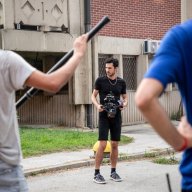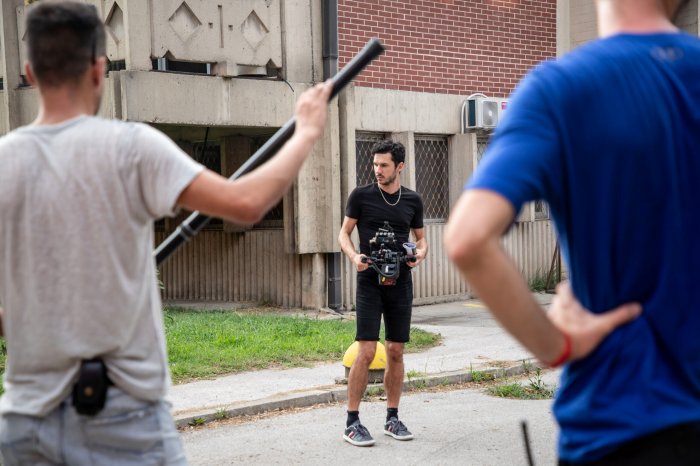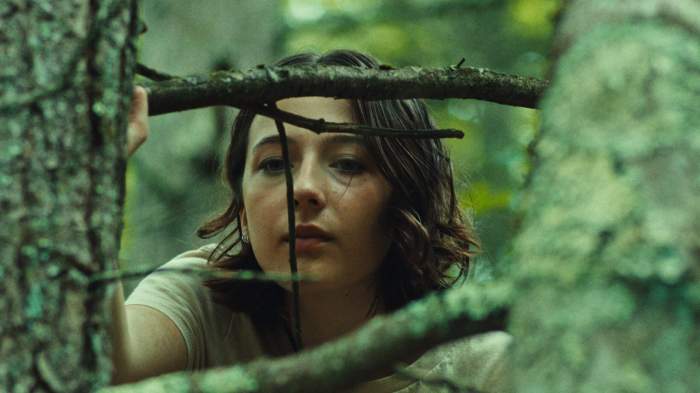BY STEVE ERICKSON / Jean-Luc Godard once said, “All you need to make a movie is a girl and a gun.”
Iranian director Rafi Pitts amends that adage to read “a man, a car, and a rifle.” His film “The Hunter” bears little resemblance to the Iranian films usually distributed in the West. The only cute kid featured here vanishes from the story quickly.
“The Hunter” lacks three-dimensional characters and psychological depth. Instead, it’s chilly — it even appears to have been shot in early winter — and violent. Rather than evoking neo-realism, it recalls some of the thrillers of French director Jean-Pierre Melville, which synthesized American film noir and European art films into a lean hybrid.
Ali (Pitts) has just been released from prison. On the eve of the 2009 elections, Iran is full of discussion of change and new promises and Ali’s life seems headed for a fresh start. Still, in the first sign that fate will trip him up, he can’t get a job on the day shift as a guard due to his ex-con background, so he’s forced to work nights.
Despite their differing schedules, Ali attempts to spend time with his wife Sara (Mitra Hajjar) and their six-year-old daughter. For recreation, he tries to take advantage of the forests north of Tehran for hunting. During a police shoot-out with “insurgents,” however, his wife is accidentally killed and his daughter disappears. Crazy with anger, Ali eventually kills two cops and flees into the forest.
Pitts’ script leaves out a lot of information that would be considered vital in most films. We never find out what crime Ali went to jail for, and the circumstances of his wife’s death are never really explained. His reliance on ellipsis, however, may be what’s most Iranian about Pitts’ film. His compatriot Abbas Kiarostami likes to talk about leaving his films’ interpretation up to the audience.
Ambiguity of this sort may be a ploy some filmmakers use to get around the censors, but that is less of a concern for Pitts than other Iranian directors. While he works in Iran (with the exception of a French-made documentary about American director Abel Ferrara), he lives in France. All four of his narrative films have been Iranian/ European co-productions.
Some of the power of “The Hunter” stems from Pitts putting his own body on the line. Looking like a less handsome cousin of Ralph Fiennes, his gaunt frame seems like a human incarnation of the film’s stripped-down aesthetic. Ali talks little, especially as he drifts further from family life into an existence on the edge.
As it happens, Pitts cast himself in the title role by accident after his lead actor showed up six hours late on the first day of shooting and had to be fired. He says the part carried him to a very dark, difficult state of mind, and the stress is palpable in his performance.
“The Hunter” hints at a political reading, but it never spells one out. Ali listens to right-wing soundbites from Ayatollah Khamenei on his car radio, but the film’s most explicit political reference comes in the opening scene, which uses extreme close-ups of a photo taken in 1980 by Manoocher Deghati that shows members of the Islamic Revolutionary Guard on their motorbikes. The nature of the “insurgents” who fight with police is left vague. Are they student demonstrators? Ali’s sudden anger at the police, motivated by his frustration at their inability to find his daughter, seems like a way of expressing political rage by indirect means.
In several scenes of “The Hunter,” Pitts fills the entire frame with cars — in one, they’re all the identical make. He shows a view of Tehran we haven’t seen before, one that looks closer to Los Angeles than to stereotypical Middle East images. His characters are trapped in their cars. A film like “Drive” makes car culture look quite appealing, while “The Hunter” suggests its alienated horrors.
In the film’s press kit, Pitts says, “Such an urban environment combined with technological progress promotes isolation, which can eventually bring about a kind of madness,” but nature brings no real solace either.
The forests north of Tehran, where Ali eventually winds up, are just as unappealing as the city’s concrete jungle. Perhaps they might be more seductive in the summer, but their winter landscape of dead trees offers no real alternative to the anomie and madness Pitts describes. Within “The Hunter,” there’s no escape from the void that Iran has become.
Essentials:
THE HUNTER
Directed by Rafi Pitts
Olive Films
In Farsi with English subtitles
Opens Jan. 4
IFC Center
323 Sixth Ave. at W. Third St.
































